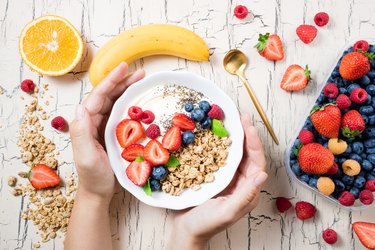
Going number two in the morning not only feels better, but it also helps prevent you from feeling bloated or backed up throughout the day.
If you struggle with having a BM in the a.m., you'll want to limit certain foods and drinks that cause constipation. And on the flip side, add these breakfast foods and drinks to your morning menu to help you go.
Video of the Day
Video of the Day
1. Oatmeal
Having oatmeal for breakfast is a habit your gut will thank you for. Oats are a good source of soluble and insoluble fiber, both of which can help prevent constipation.
Soluble fiber soaks up water, making stool large and soft and therefore easier to pass. Insoluble fiber, on the other hand, moves more quickly through your GI tract, which promotes regularity and helps prevent constipation, according to Harvard Health Publishing. Plus, oats are a prebiotic, which acts as a fuel source of probiotics in our gut, adding to your overall gut health.
2. Coffee
Many of us enjoy an a.m. cup of coffee because it helps us wake up and ready to tackle the day. It can do the same for your gut, too. Yes, coffee poops are a real thing.
Caffeinated coffee can signal your stomach to produce more acid and increase colon movements, which can lead to a laxative effect in some people, per a June 2017 review in the World Journal of Gastroenterology. Decaf coffee has a similar effect on our bowels, according to a small study published in April 1990 in the journal Gut.
3. Fruit
Love having eggs and turkey bacon or yogurt with cereal? That's A-OK — just add more fiber to your breakfast by including a side of fruit. Fruits are high in water and fiber, a winning duo when it comes to helping you poop.
Certain fruits like bananas have additional digestive benefits beyond their fiber content. Hint: It has to do with the type of fiber found in these fruits.
Bananas are a natural source of inulin, a fiber that helps relieve constipation and can prevent it from occurring, according to an August 2016 review published in Carbohydrate Polymers.
4. Kefir and Yogurt
Dairy products like cheese and milk can go either way: They can cause diarrhea, worsen diarrhea or they can leave you feeling backed up.
But kefir is a unique source of dairy, much like yogurt, because it is also a rich source of probiotics — and preliminary research suggests these beneficial bacteria can help get your gut moving.
After drinking a daily kefir beverage for four weeks, stool frequency and consistency were increased and laxative use decreased compared to the baseline in a small group of people living with chronic constipation, a July 2019 study in the Turkish Journal of Gastroenterology found.
What's more, Lactobacillus casei, the probiotic strain typically found in yogurt and kefir helps to soften hard stools, per a January 2019 study in the Journal of Neurogastroenterology and Motility.
5. Smoothies
If made with the right ingredients (read: fruit, vegetables, nut butters, whole grains, legumes and probiotic-rich dairy), smoothies have the power to help get things going in the morning.
They're a better pick compared to juices because when you make a smoothie, you're retaining all of the fiber from the fruits, vegetables, nuts and other foods that you're using. Juice, on the other hand, removes the fiber from the foods.
Smoothies are a simple and tasty way to get all of these high-fiber foods down in one shot. Plus, liquids are almost always added to smoothies, which means fluids are making their way into your GI tract. Being properly hydrated can keep you from becoming constipated.
6. Actually Eating Breakfast
It's called breakfast for a reason — you are literally breaking the fast. By eating breakfast and putting food into your GI tract, you are "waking up" your gut by kickstarting the digestion process.
The digestion process becomes automatic after that first swallow, moving food through your body via peristalsis, aka movement of the GI tract walls, according to the National Institute of Diabetes and Digestive Kidney Diseases.
As your body begins moving your breakfast through your GI tract, it continues to move through food that may still be sitting in your gut from the day before.
- Harvard Health Publishing: "Oats"
- Carbohydrate Polymers: "Inulin: Properties, Health Benefits and Food Applications"
- Turkish Journal of Gastroenterology: "Effects of a Kefir Supplement on Symptoms, Colonic Transit, and Bowel Satisfaction Score in Patients With Chronic Constipation: A Pilot Study"
- Journal of Neurogastroenterology and Motility: "Differential Effects of Lactobacillus casei Strain Shirota on Patients With Constipation Regarding Stool Consistency in China"
- National Institute of Diabetes and Digestive Kidney Diseases: "Your Digestive System & How it Works"
- World Journal of Gastroenterology: "Diet in irritable bowel syndrome: What to recommend, not what to forbid to patients!"